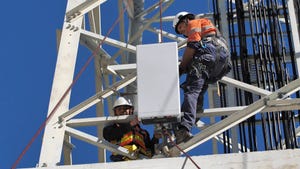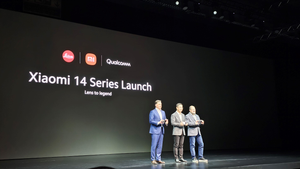Intel VC Resurfaces at Ignis Optics
Michael Lebby, ex-leader of Intel Capital's optical investments, heads components design firm
March 20, 2001

ANAHEIM, Calif. - OFC 2001 - Ignis Optics is not completely out of stealth stage, but when your executives are running around the show floor with cool new black-and-gold logo shirts and caps, you're not exactly shunning publicity, either.
"We don't have a booth here, but we did want to have a presence," says Michael Lebby, CEO and founder of Ignis, which Lebby says is an optoelectronics components startup that will design, but not produce, components.
"We're not going to build a foundry," says Lebby of Ignis, which will instead outsource designs for systems vendors, first targeting those that build products for the metro and access services markets.
Ignis, Lebby says, is a "manufacturing infrastructure play" whose main thrust will be to help systems vendors design components that can be manufactured more rapidly and at a lower cost than current offerings, thereby cutting costs for both producers and purchasers of optical systems.
"Metro and customer-premises systems providers are under acute pricing pressures right now," says Atikem Haile-Mariam, Ignis's vice president of marketing. "CLECs are hurting, and the cost savings from equipment are not there."
Lebby and Haile-Mariam are both recent refugees from Intel Corp.'s (Nasdaq: INTC) Intel Capital division, where Lebby headed up the team in charge of Intel's investments in the optical space. Lebby says during his tenure there he saw plenty of optical-components business plans that he predicts may fade quickly after their initial investment money dries up, because their designs are inefficient and too costly (see Intel Swaggers Into OC192 Market).
"The industry needs a better manufacturing infrastructure," Lebby says. "[Systems builders] are sick and tired of science projects."
Haile-Mariam says that Ignis (which Lebby says already has a small but "extremely experienced" team of components designers) won't look to design the "latest and greatest" components, but will instead focus on making better versions of products for the 10-Gigabit and OC48 product markets.
Lebby says Ignis will release more company information later this year, perhaps at one of the summer trade shows. The company, based in Palo Alto, has an undisclosed initial round of funding from Morgenthaler Ventures and Storm Ventures.
"We're not stealth anymore, but we're not hyping things yet either," Lebby says.
-- Paul Kapustka, Editor at Large, Light Reading http://www.lightreading.com
You May Also Like










